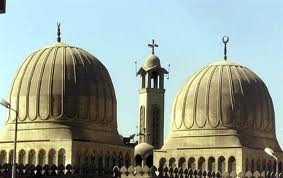
According to Egyptian government statistics, more than 90% of the 58 million people of Egypt are Muslims, while less than 7% are Christians. However, Egypt's Christian community has long claimed that the percentage of Christians is much higher, reaching between 15% to 20% of the population. The failure of the Egyptian government to allow the Christian churches to take a census and publish the results suggests that official figures may well underestimate the size of the Christian community.
At the time of the Arab-Islamic invasion of 639-641 AD, Egypt was a predominantly Christian country. According to Coptic tradition St. Mark brought the Gospel to Egypt in 42 AD. Alexandria soon became one of the most important ecclesiastical centres of the the Christian world. The Egyptians Apollos, Athanasius, Clement and Cyril of Alexandria number among the fathers of the early Church. Christianity became the state religion in Egypt, as elsewhere in the Roman Empire, in 323 AD following the conversion of the Emperor Constantine. When the Roman world was divided into two halves in 395 AD, Egypt was included in the eastern - or Byzantine - Empire, where it remained until the Arab conquest.
The vast majority of Egypt's Christians adhere to the ancient Coptic Orthodox Church. Coptic simply means Egyptian in the pre-Arabic language of the country. This ancient Coptic church became ecclesiastically isolated from the church in Europe in 451 AD when political differences with Rome led to an irrevocable split at the Council of Chalcedon. At the Council the conflict with Rome took the form of a theological debate. The Copts maintained that the natures of God and man are united in Christ, while the majority at the Council claimed that the two natures coexisted in Him. This theological difference distinguishes the Coptic Orthodox Church and other non-Chalcedonian churches - i.e. the Armenian Apostolic Church and the Syrian Orthodox Church - from most other Christian Churches. The Coptic Orthodox Church is characterized by a strict adherence to its ancient creeds and liturgy and a strong monastic tradition. In recent decades a growing evangelical renewal movement has been at work within the Church. The bishop of Alexandria, Pope Shenouda III, stands at the head of the Church as its Patriarch. The Coptic Orthodox Church belongs to the World Council of Churches and the Middle East Council of Churches.
About 200,000 Egyptian citizens adhere to the Roman Catholic Church, which includes communities worshipping according to six different rights: Coptic, Greek, Maronite, Syrian, Chaldean and Latin. Most Catholics or their ancestors came from the Coptic community and continue to worship according to the Coptic-rite. Catholicism won its first Egyptian converts in modern times in the 18th century when the Coptic Orthodox Church was spiritually and intellectually at a low ebb. The Vatican permitted the retention of the Coptic liturgy and the marriage of priests to encourage the growth of the Catholic Church in Egypt.
Over 400,000 Egyptians are believed to be associated with a Protestant congregation, though formal adult membership is much lower. A significant number of worshippers in Protestant churches are Coptic Orthodox who have not changed their church membership. The roots of Egypt's Protestant churches lie in 19th century missionary activity. The strongest missionary work was performed by Presbyterians. Most Egyptian Protestants come from a Coptic Orthodox rather than a Muslim background. Most of the country's Protestant churches are associated with the Coptic Protestant Union, which is the principle intermediary between the congregations and the state. Dr. Samuel Habib is the current President of the Protestant Union. The Assemblies of God, the Brethren, the Methodists, the Presbyterians and various independent groups all have congregations in Egpyt.
Islam came to Egypt when the country was conquered by the armies of the Arab Empire in the 7th century AD. The Muslim invaders were not vigorously opposed by the Egyptian Christians. The Arab Empire appeared to offer relief from the political oppression and economic exploitation of the Byzantine Empire. Small in numbers, the Muslim conquerors could not at first afford to persecute violently the Christian Church before the consolidation of their power. Islam became the faith of the majority in Egypt only after several centuries of gradual Islamization.
Egypt's Muslim leaders and thinkers have made a great contribution to the revival of Islam throughout the Sunni Muslim world in the last half of the 20th century. These intellectuals include adherents of both the non-revolutionary, orthodox Muslim establishment - e.g., Al-Azhar University - and the various militant revolutionary groups - the radical faction of the Muslim Brotherhood and Gamma Islamiyya. Egypt also has a small number of religiously non-doctrinaire, westward-looking Muslim intellectuals. Most Egyptian Muslims are not firmly committed to any of these tendencies. However the influence of the fundamentalists, both non-revolutionary and militant, has a strong edge and is on the rise amongst the population at large.




